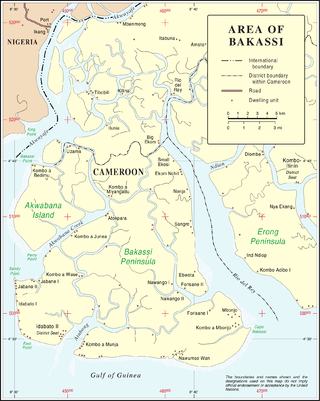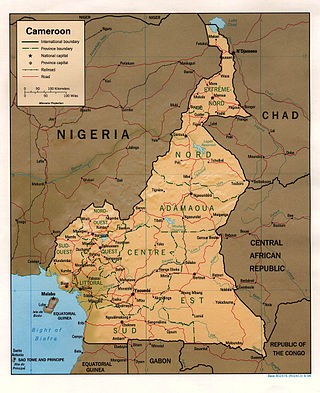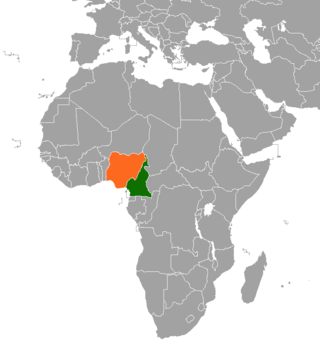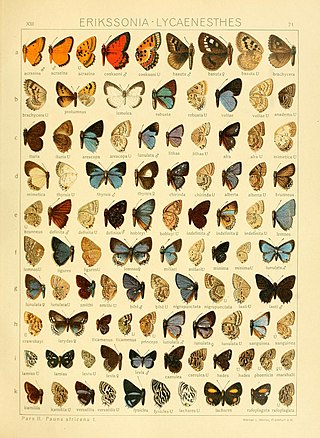| |||||
| Decades: | |||||
|---|---|---|---|---|---|
| See also: | |||||
Events in the year 1961 in Nigeria .
| |||||
| Decades: | |||||
|---|---|---|---|---|---|
| See also: | |||||
Events in the year 1961 in Nigeria .

Bakassi is a peninsula on the Gulf of Guinea. It lies between the Cross River estuary, near the city of Calabar and the Rio del Ray estuary on the east. It is governed by Cameroon, following the transfer of sovereignty from neighbouring Nigeria as a result of a judgment by the International Court of Justice. On 22 November 2007, the Nigerian Senate rejected the transfer, since the Greentree Agreement ceding the area to Cameroon was contrary to Section 12(1) of the 1999 Constitution. Regardless, the territory was completely ceded to Cameroon on 14 August 2008, exactly two years after the first part of it was transferred.

Cameroon, officially the Republic of Cameroon, is a country in Central Africa. It shares boundaries with Nigeria to the west and north, Chad to the northeast, the Central African Republic to the east, and Equatorial Guinea, Gabon, and the Republic of the Congo to the south. Its coastline lies on the Bight of Biafra, part of the Gulf of Guinea, and the Atlantic Ocean. Due to its strategic position at the crossroads between West Africa and Central Africa, it has been categorized as being in both camps. Cameroon's population of nearly 31 million people speak 250 native languages, in addition to the national tongues of English and French, or both. Early inhabitants of the territory included the Sao civilisation around Lake Chad and the Baka hunter-gatherers in the southeastern rainforest. Portuguese explorers reached the coast in the 15th century and named the area Rio dos Camarões, which became Cameroon in English. Fulani soldiers founded the Adamawa Emirate in the north in the 19th century, and various ethnic groups of the west and northwest established powerful chiefdoms and fondoms.
At the crossroads of West Africa and Central Africa, the territory of what is now Cameroon has seen human habitation since some time in the Middle Paleolithic, likely no later than 130,000 years ago. The earliest discovered archaeological evidence of humans dates from around 30,000 years ago at Shum Laka. The Bamenda highlands in western Cameroon near the border with Nigeria are the most likely origin for the Bantu peoples, whose language and culture came to dominate most of central and southern Africa between 1000 BCE and 1000 CE.

At 475,440 km2 (183,570 sq mi), Cameroon is the world's 53rd largest country. It is slightly larger than the nation of Sweden and the US state of California. It is comparable in size to Papua New Guinea. Cameroon's landmass is 472,710 km2 (182,510 sq mi), with 2,730 km2 (1,050 sq mi) of water.

British Cameroons or British Cameroon was a British mandate territory in British West Africa, formed of the Northern Cameroons and Southern Cameroons. Today, the Northern Cameroons forms parts of the Borno, Adamawa and Taraba states of Nigeria, while the Southern Cameroons forms part of the Northwest and Southwest regions of Cameroon.

Paul Biya is a Cameroonian politician who has served as the second president of Cameroon since 1982, having previously been the fifth prime minister of Cameroon from 1975 to 1982. As of 2024, he is the second-longest-ruling president in Africa and the longest consecutively serving current non-royal national leader in the world and the oldest head of state in the world.

Adamawa State is a state in the North-East geopolitical zone of Nigeria, bordered by Borno to the northwest, Gombe to the west, and Taraba to the southwest while its eastern border forms part of the national border with Cameroon. It takes its name from the historic emirate of Adamawa, with the emirate's old capital of Yola serving as the capital city of Adamawa State. The state was formed in 1991 when the former Gongola State was broken up into Adamawa and Taraba states. The state is one of the most heterogeneous in Nigeria, having over 100 indigenous ethnic groups.

The Southern Cameroons was the southern part of the British League of Nations mandate territory of the British Cameroons in West Africa. Since 1961, it has been part of the Republic of Cameroon, where it makes up the Northwest Region and Southwest Region. Since 1994, pressure groups in the territory claim there was no legal document in accordance to UNGA RES 1608(XV) paragraph 5, and are seeking to restore statehood and independence from the Republic. They renamed the British Southern Cameroons as Ambazonia.

Boko Haram, officially known as Jamā'at Ahl as-Sunnah lid-Da'wah wa'l-Jihād, is an Islamist terrorist jihadist organization based in northeastern Nigeria, which is also active in Chad, Niger, northern Cameroon, and Mali. In 2016, the group split, resulting in the emergence of a hostile faction known as the Islamic State's West Africa Province.
Dikwa is a town and a local government area in Borno State, Nigeria.

Relations between Cameroon and Nigeria were established in 1960, the same year that each country obtained its independence. Since then, their relationship has revolved in large part around their extensive shared border, as well as the legacy of colonial arrangements under which areas of Cameroon were administered as part of British Nigeria. The countries came close to war in the 1990s in the culmination of a long-running dispute over the sovereignty of the Bakassi peninsula. In the 21st century, however, a return to conviviality has been achieved, partly because the demarcation of their border has been formalised, and partly because the Boko Haram insurgency in the Lake Chad basin has necessitated increasingly close cooperation in regional security matters.

The Boko Haram insurgency began in July 2009, when the militant Islamist and jihadist rebel group Boko Haram started an armed rebellion against the government of Nigeria. The conflict is taking place within the context of long-standing issues of religious violence between Nigeria's Muslim and Christian communities, and the insurgents' ultimate aim is to establish an Islamic state in the region.
This is a survey of the postage stamps and postal history of Nigeria.

The postal history of the British Cameroons falls into two essential parts: the occupation of German Kamerun by Anglo-French forces in 1915, when German Colonial stamps were issued with an overprint and surcharge; and the situation following a 1961 plebiscite, after which the former British Cameroons, today known as Ambazonia, was divided between Cameroon and Nigeria.
A United Nations referendum was held in the British Cameroons on 11 February 1961 to determine whether the territory should join neighbouring Cameroon or Nigeria. This followed an earlier plebiscite in the Northern Cameroons in 1959 which voted to postpone a decision. The option of full independence was not on the ballot, having been opposed by Andrew Cohen, the UK representative to the UN Trusteeship Council, as well as African and anti-colonial delegations, notably by E. M. L. Endeley, who favoured independence by joining Nigeria, and John Ngu Foncha, who favoured independence by joining Francophone Cameroon.

French Cameroon, also known as the French Cameroons, was a French mandate territory in Central Africa. It now forms part of the independent country of Cameroon.

Anthene rubricinctus, the indigo ciliate blue, is a butterfly in the family Lycaenidae. It is found in Guinea, Sierra Leone, Liberia, Ivory Coast, Ghana, Togo, Nigeria, Cameroon, the Republic of the Congo, Gabon, Angola, the Democratic Republic of the Congo, Uganda, Kenya, Tanzania, Malawi and Zambia. The habitat consists of forest, especially stream banks.
Timeline of the Boko Haram insurgency is the chronology of the Boko Haram insurgency, an ongoing armed conflict between Nigerian Islamist group Boko Haram and the Nigerian government. Boko Haram have carried out many attacks against the military, police and civilians since 2009, mostly in Nigeria. The low-intensity conflict is centred on Borno State. It peaked in the mid-2010s, when Boko Haram extended their insurgency into Cameroon, Chad and Niger.

Religious violence in Nigeria refers to Christian-Muslim strife in modern Nigeria, which can be traced back to 1953. Today, religious violence in Nigeria is dominated by the Boko Haram insurgency, which aims to establish an Islamic state in Nigeria. Since the turn of the 21st century, 62,000 Nigerian Christians have been killed by the terrorist group Boko Haram, Fulani herdsmen and other groups. The killings have been referred to as a silent genocide.

The Cameroon–Nigeria border is 1,975 km in length and runs from the tripoint with Chad in the north to the Atlantic Ocean in the south.